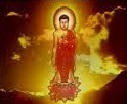The essential practice in Pure Land Buddhism is the chanting of the name of Amitabha Buddha with total concentration, trusting that one will be reborn in the Pure Land, a place where it is much easier for a being to work towards enlightenment.
Pure Land Buddhism adds mystical elements to the basic Buddhist teachings which make those teachings easier (and more comforting) to work with.
These elements include faith and trust and a personal relationship with Amitabha Buddha, who is regarded by Pure Land Buddhists as a sort of saviour; and belief in the Pure Land, a place which provides a stepping stone towards enlightenment and liberation.
 Pure Land Buddhism is particularly popular in China and Japan.
Pure Land Buddhism is particularly popular in China and Japan.
History
Pure Land Buddhism as a school of Buddhist thinking began in India around the 2nd century BCE.
It spread to China where there was a strong cult of Amitabha by the 2nd century CE, and then spread to Japan around the 6th century CE.
Pure Land Buddhism received a major boost to its popularity in the 12th century with the simplifications made by Honen.
A century later Shinran (1173-1262), a disciple of Honen, brought a new understanding of the Pure Land ideas, and this became the foundation of the Shin (true) sect.
Pure Land Buddhism took off in Japan when the monk Honen (1133-1212) simplified the teachings and practices of the sect so that anyone could cope with them.
He eliminated the intellectual difficulties and complex meditation practices used by other schools of Buddhism.
Honen taught that rebirth in the Pure Land was certain for anyone who recited the name with complete trust and sincerity. Honen said that all that was needed was…
saying “Namu Amida Butsu” with a conviction that by saying it one will certainly attain birth in the Pure Land.
Honen
The result was a form of Buddhism accessible to anyone, even if they were illiterate or stupid.
Honen didn’t simplify Buddhism through a patronising attitude to inferior people. He believed that most people, and he included himself, could not achieve liberation through any of their own activities. The only way to achieve buddhahood was through the help of Amitabha.
The Shin Sect
A century after Honan, one of his disciples, Shinran (1173-1262) brought a new understanding of the Pure Land ideas. Shinran taught that what truly mattered was not the chanting of the name but faith. Chanting on its own had no value at all.
Those who follow the Shin school say that liberation is the consequence of a person achieving genuine faith in Amitabha Buddha and his vow to save all beings who trusted in him.
Amitabha
Amitabha in context
The Pure Land sect emphasises the important role played in liberation by Amitabha (which means Immeasurable Light) who is also called Amitayus (which means Immeasurable Life).
 People who sincerely call on Amitabha for help will be reborn in Sukhavati – The Pure Land or The Western Paradise – where there are no distractions and where they can continue to work towards liberation under the most favourable conditions.
People who sincerely call on Amitabha for help will be reborn in Sukhavati – The Pure Land or The Western Paradise – where there are no distractions and where they can continue to work towards liberation under the most favourable conditions.
The nature of Amitabha is not entirely clear. Encyclopedia Britannica describes him as “the great saviour deity worshiped principally by members of the Pure Land sect in Japan.” Another writer says “Amitabha is neither a God who punishes and rewards, gives mercy or imposes tests, nor a divinity that we can petition or beg for special favours”.
The mystical view of Amitabha regards him as an eternal Buddha, and believes that he manifested himself in human history as Gautama, or “The Buddha”.
Amitabha translates as “Amito-fo” in Chinese and “Amida” in Japanese.
The story of Amitabha
Once there was a king who was so deeply moved by the suffering of beings in the world that he gave up his throne and became a monk named Dharmakara.
Dharmakara was heavily influenced by the 81st Buddha and vowed to become a Buddha himself, with the aim of creating a Buddha-land that would be free of all limitations.
He meditated at length on other Buddha-lands and set down what he learned in 48 vows. Eventually he achieved enlightenment and became Amitabha Buddha and established his Buddha-land of Sukhavati.
His most important vow was the 18th, which said:
If I were to become a Buddha, and people, hearing my Name, have faith and joy and recite it for even ten times, but are not born into my Pure Land, may I not gain enlightenment.
Since he did gain enlightenment, it follows that those who do have faith and joy and who recite his name will be born into the Pure Land.
The whole article is originated from BBC News




